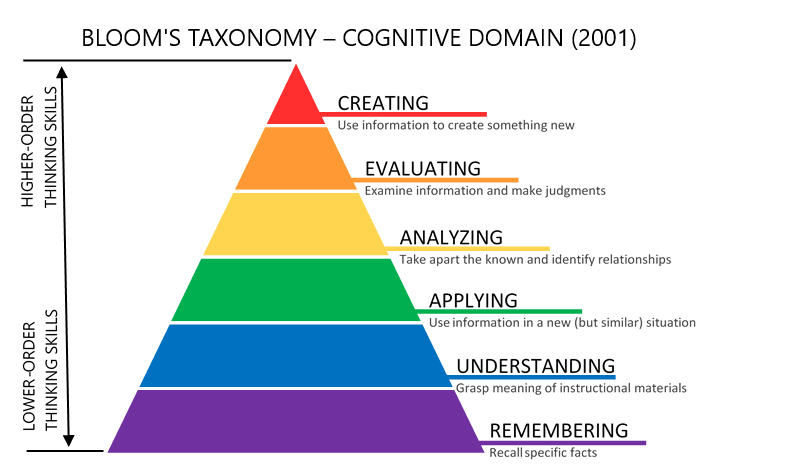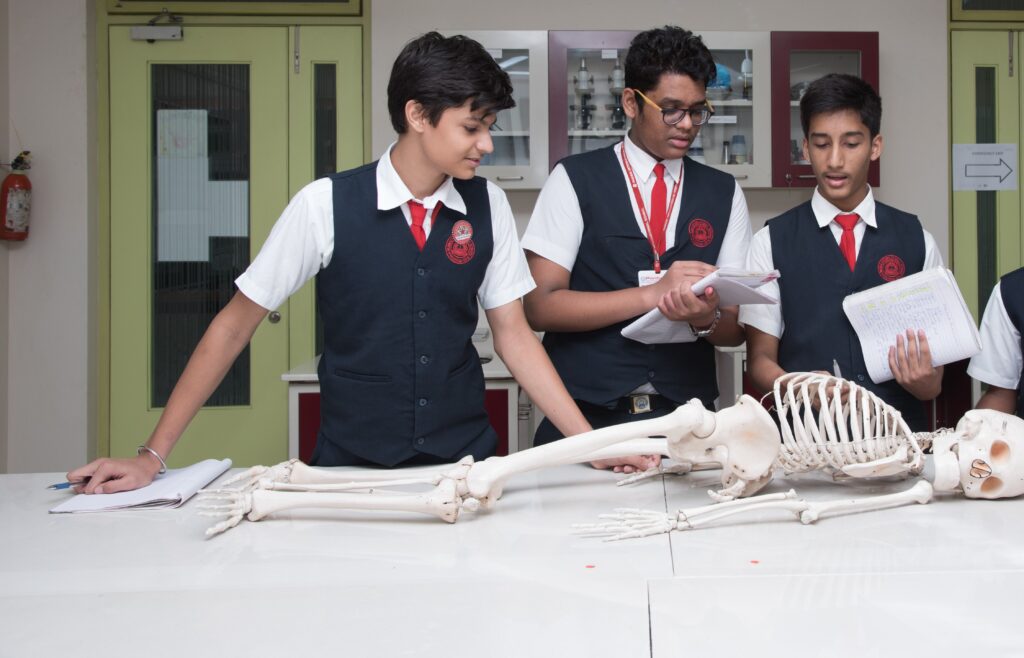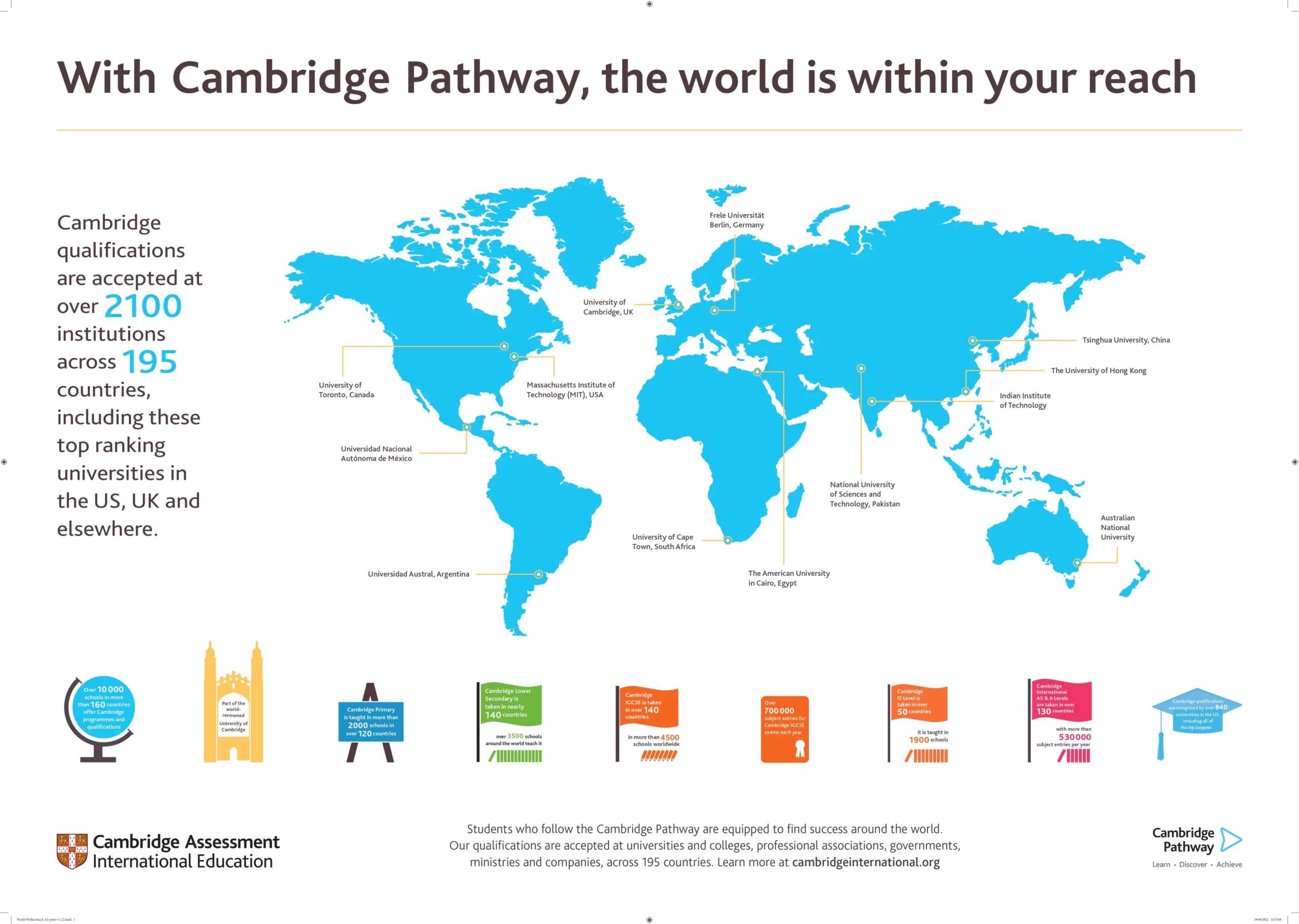Panbai International School – PBIS
December 2, 2019 2024-06-06 8:14Panbai International School – PBIS
PBIS Enquiry Form
At Panbai International School we are proud to introduce The Cambridge Pathway, an educational framework developed by Cambridge Assessment International Education (CAIE) to provide a coherent and structured learning journey for students from Grade 1 to Grade 10. It offers a comprehensive and flexible curriculum that focuses on developing a wide range of skills, knowledge, and understanding in students.


Cambridge Primary


Cambridge Lower Secondary


Cambridge IGCSE
Objectives for Cambridge learners at Panbai International School (PBIS):
Cambridge programs and qualifications develop not only content but also skills. We help learners to bridge the gap to the next stage of education and the world of work.
We encourage Cambridge learners to be:
• Confident in working with information and ideas.
• Responsible for themselves, responsive to and respectful of others.
• Reflective as learners, developing their ability to learn.
• Innovative and equipped for new and future challenges.
• Engaged intellectually and socially ready to make a difference.
Bloom's Taxonomy of Learning
Panbai International School seamlessly blends Bloom’s Taxonomy into its education, fostering student development. We start with foundational knowledge, emphasizing Remembering, where students acquire facts as a base for higher-order thinking.
Bloom’s Taxonomy includes six levels, representing various cognitive skills:
- Remembering: Recalling facts, listing, defining, describing.
- Understanding: Explaining, interpreting, summarizing.
- Applying: Using knowledge in solving problems.
- Analyzing: Breaking down information, identifying patterns.
- Evaluating: Assessing information, making judgments.
- Creating: Generating new ideas, original work.


Bloom's Taxonomy of Learning
Panbai International School seamlessly blends Bloom’s Taxonomy into its education, fostering student development. We start with foundational knowledge, emphasizing Remembering, where students acquire facts as a base for higher-order thinking.
Bloom’s Taxonomy includes six levels, representing various cognitive skills:
- Remembering: Recalling facts, listing, defining, describing.
- Understanding: Explaining, interpreting, summarizing.
- Applying: Using knowledge in solving problems.
- Analyzing: Breaking down information, identifying patterns.
- Evaluating: Assessing information, making judgments.
- Creating: Generating new ideas, original work.
Cambridge Primary:
Embarking on an engaging educational voyage, Cambridge
Primary initiates young learners into their learning experience. Tailored for children
aged 5 to 11 (Grade 1 to Grade 5), it establishes a robust educational base as they
commence their schooling journey, seamlessly guiding them through the appropriate
stages of the Cambridge Pathway.
- The curriculum includes academic and vocational subjects in order to broaden
the knowledge of our youngsters. - Physical Education (PE) is compulsory for all.
- Subjects offered for primary students are:
English Maths
Science French or Hindi
Marathi Global Prospective
ICT Art & Design


Cambridge Primary:
Embarking on an engaging educational voyage, Cambridge
Primary initiates young learners into their learning experience. Tailored for children
aged 5 to 11 (Grade 1 to Grade 5), it establishes a robust educational base as they
commence their schooling journey, seamlessly guiding them through the appropriate
stages of the Cambridge Pathway.
- The curriculum includes academic and vocational subjects in order to broaden
the knowledge of our youngsters. - Physical Education (PE) is compulsory for all.
- Subjects offered for primary students are:
English Maths
Science French or Hindi
Marathi Global Prospective
ICT Art & Design
Cambridge Secondary 1 (Checkpoint):
Cambridge Secondary 1 develops skills and understanding in English, Mathematics and Science for learners typically aged
between 11 to 14 years (Grade 6 to Grade 8).
- Checkpoint tests have been designed to assess learners at the end of
Cambridge Secondary 1. They are available in English, English as a second
language, mathematics and science, and give valuable feedback on learners’
strengths and weaknesses before they progress to the next stage of education.
Each learner receives a statement of achievement and a diagnostic feedback
report, giving schools detailed information and parents extra trust in the feedback
they receive. - The curriculum promotes an enquiry-based approach to learning to develop
thinking skills and encourage intellectual engagement. - The curriculum encourages learners to be confident, creative and intellectually
engaged, capable of applying their skills to respond to a range of information,
media and text with enjoyment and understanding. - The Scientific enquiry objectives underpin Biology, Chemistry and Physics, which
are focused on developing confidence and interest in scientific knowledge.
Environmental awareness and some history of science are also incorporated. - This curriculum focuses on principles, patterns, systems, functions and
relationships so that learners can apply their mathematical knowledge and
develop a holistic understanding of the subject.


Cambridge Secondary 1 (Checkpoint):
Cambridge Secondary 1 develops skills and understanding in English, Mathematics and Science for learners typically aged
between 11 to 14 years (Grade 6 to Grade 8).
- Checkpoint tests have been designed to assess learners at the end of
Cambridge Secondary 1. They are available in English, English as a second
language, mathematics and science, and give valuable feedback on learners’
strengths and weaknesses before they progress to the next stage of education.
Each learner receives a statement of achievement and a diagnostic feedback
report, giving schools detailed information and parents extra trust in the feedback
they receive. - The curriculum promotes an enquiry-based approach to learning to develop
thinking skills and encourage intellectual engagement. - The curriculum encourages learners to be confident, creative and intellectually
engaged, capable of applying their skills to respond to a range of information,
media and text with enjoyment and understanding. - The Scientific enquiry objectives underpin Biology, Chemistry and Physics, which
are focused on developing confidence and interest in scientific knowledge.
Environmental awareness and some history of science are also incorporated. - This curriculum focuses on principles, patterns, systems, functions and
relationships so that learners can apply their mathematical knowledge and
develop a holistic understanding of the subject.
Cambridge Secondary 2 (IGCSE):
It represents the best possible international
education for 14 to 16 year olds. It develops learner knowledge, understanding and
skills in:
• Subject content.
• Applying knowledge and understanding to new as well as familiar situations.
• Intellectual enquiry.
• Flexibility and responsiveness to change.
• Working and communicating in English.
• Influencing outcomes.
• Cultural awareness.
Cambridge IGCSE assessment takes place at the end of the course and can include
written, oral, coursework and practical assessment.
In many subjects there is a choice between core and extended curricula, making
Cambridge IGCSE suitable for a wide range of abilities.
Grades are benchmarked using eight internationally recognized grades, A* to G,
which have clear guidelines to explain the standard of achievement for each grade.


Cambridge Secondary 2 (IGCSE):
It represents the best possible international
education for 14 to 16 year olds. It develops learner knowledge, understanding and
skills in:
• Subject content.
• Applying knowledge and understanding to new as well as familiar situations.
• Intellectual enquiry.
• Flexibility and responsiveness to change.
• Working and communicating in English.
• Influencing outcomes.
• Cultural awareness.
Cambridge IGCSE assessment takes place at the end of the course and can include
written, oral, coursework and practical assessment.
In many subjects there is a choice between core and extended curricula, making
Cambridge IGCSE suitable for a wide range of abilities.
Grades are benchmarked using eight internationally recognized grades, A* to G,
which have clear guidelines to explain the standard of achievement for each grade.





